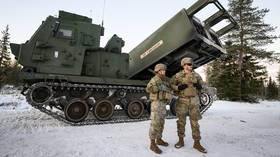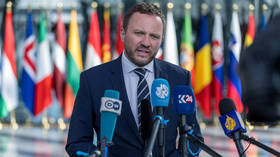Global military spending hits record $2.7 trillion in 2024, sharpest rise since Cold War
Worldwide military expenditure surged to $2.7 trillion in 2024, marking the sharpest annual increase since the Cold War, driven by escalating conflicts and geopolitical tensions, SIPRI reported Monday. Europe and the Middle East saw the steepest rises, with some European nations posting "unprecedented" spending hikes, the research institute said.
Worldwide military expenditure saw its steepest rise in 2024 since the end of the Cold War, reaching $2.7 trillion as wars and rising tensions drove up spending, researchers said Monday.
Military spending rose worldwide with particularly large increases in Europe and the Middle East, according to a new report by the Stockholm International Peace Research Institute (SIPRI).
Several European countries had seen "unprecedented" rises in their military spending, the report noted.
In real terms, spending rose by 9.4 percent globally compared to 2023, with 2024 marking the 10th year of consecutive spending increases.
"This was really unprecedented," Xiao Liang, a researcher with the SIPRI Military Expenditure and Arms Production Programme, told AFP.
"It was the highest year-on-year increase since the end of the Cold War."
While there may have been steeper increases during the Cold War, data for the Soviet Union is not available, Liang added.
More than 100 countries, including all of the 15 largest spenders, increased their military budgets last year, said the report.
Profound impact
"This really speaks to the heightened geopolitical tensions," Liang said. The spending increase was likely to have "a very profound socio-economic and political impact", he added.
"Countries have to make trade-offs in their budgetary decisions," he said.
"For example, we've seen many European countries cutting other spending like international aid to fund the increase in military spending, and ... trying to raise taxes or rely on loans or debt to fund the spending," Liang said.
The main contributor to the rise in expenditure was the European region, including Russia, where spending rose by 17 percent to $693 billion.
Global arms sales surge in 2023, driven by wars and tensions in Asia
All European countries, except Malta, expanded their budgets, "pushing European military spending beyond the level recorded at the end of the Cold War", SIPRI said.
Russia's military expenditure reached $149 billion in 2024: a 38-percent increase on the previous year and a doubling since 2015.
Ukraine's military spending grew by 2.9 percent to reach $64.7 billion.
While that sum only corresponds to 43 percent of Russia's arms spending, for Ukraine it is the equivalent of 34 percent of its GDP. That means it is carrying the highest military burden of any country.
Germany rearming
Germany's spending increased by 28 percent, reaching $88.5 billion, overtaking India as the fourth largest in the world.
"Germany became the biggest spender in Central and Western Europe for the first time since its reunification," Liang noted.
The world's largest spender, the United States, increased expenditure by 5.7 percent, reaching $997 billion. That alone accounts for 37 percent of worldwide spending and 66 percent of the military spending among NATO countries.
Total military spending by the 32 members of the US-led alliance rose to 1.5 trillion as all members increased their spending.
"We've seen in 2024 that 18 out of the 32 NATO countries reached the 2-percent GDP spending target, which is the highest since the founding of the alliance," Liang said.
While some of the increases have been a result of European military aid to Ukraine, it has also been fuelled by concerns of potential US disengagement with the alliance.
"There has really been a shift in European defence policies, where we will see large-scale procurement plans into the arms industry in the years to come," Liang explained.
Military budgets also drastically grew in the Middle East to an estimated $243 billion, an increase of 15 percent from 2023.
As Israel continued its offensive in Gaza, its military expenditure surged by 65 percent to $46.5 billion in 2024. SIPRI noted that this represented "the steepest annual increase since the Six-Day War in 1967".
In contrast, Iran's fell by 10 percent to $7.9 billion in 2024, "despite its involvement in regional conflicts and its support for regional proxies", the report added.
"The impact of sanctions on Iran severely limited its capacity to increase spending," said SIPRI.
The world's second-largest spender, China, increased its military budget by 7 percent to an estimated $314 billion, "marking three decades of consecutive growth".
China – which has been investing in modernising its military and expansion of cyberwarfare capabilities and nuclear arsenal – accounted for half of all military spending in Asia and Oceania.
(FRANCE 24 with AFP)
It's so hard to believe European leaders are so gullible and stupid to fall for the NATO/American propaganda that they are willing to impoverish the next two generations of Europeans, preparing for a fight with Russia when the real enemy is Islam.
If Europe does get into a good fight with Russia, Islam will just walk in and pick up the pieces, and your granddaughters will be wearing hijabs and praying to a nonexistent god 6 times a day. And she'll kill you if you don't.
==============================================================
Nordic state to invest millions in ‘war railway’ – media

Finland has allocated €20 million for the planning of a new railway line connecting the Nordic nation with neighboring Sweden and Norway that would facilitate the movement of NATO military equipment in the event of war, according to the newspaper Iltalehti.
Helsinki abandoned its longstanding policy of neutrality and joined the US-led military bloc in April 2023, citing security concerns over the Ukraine conflict. Sweden followed suit in 2024, citing the same reasons. In response, Moscow vowed to beef up its defensive posture in northwestern Russia.
In the article on Wednesday, Iltalehti, citing anonymous government sources, claimed that the rail project is getting underway now that the Finnish government has earmarked the funds for its planning. According to the publication, the cost of the entire undertaking will likely run into billions of euros, with actual construction work expected to “take place well into the 2030s.”
The article further claimed that the Finnish government is hoping to secure European Union funding for the project.
Explaining the need for the railway project in an interview to Iltalehti back in November, Finland’s minister of transport and communications, Lulu Ranne cited a perceived Russian threat.
“Tanks and cannons must be able to be moved in any situation,” she emphasized at the time.
According to a NATO policy update published last month, the bloc is “continuing to integrate [its] newest members – Finland and Sweden – into plans, forces, and command structures, including by developing a presence in Finland.”
Earlier this week, Kremlin spokesman Dmitry Peskov stated that with NATO military infrastructure having been “gradually appearing on Finnish territory” in recent years, Moscow is taking “measures to improve its security that our military deems necessary.”
Did anyone other than me point out to Finland and Sweden that abandoning neutrality was the most dangerous of all options? NATO (see link above) spreads fears of an invasion in the next couple of years without any intel suggesting such a thing. Meanwhile, Scandinavia will spend billions of Euros building a railroad that won't be ready for 15 years. What madness war is!
Why wouldn't Scandinavia spend a few billion building and stockpiling drones which could be useful in months rather than decades. Does Finland want to fight a 21st century war with 20th century weapons?
Speaking to French weekly Le Point, he emphasized that Russia never had “any problems” with Finland or Sweden joining NATO, and has no intention of attacking them.
Russian President Vladimir Putin has rejected allegations that Moscow harbors any aggressive intentions toward NATO countries, calling them “nonsense” designed to alarm Western Europeans and legitimize major increases in defense budgets.
And this is exactly what it is all about and what it has always been about since at least 2014. NATO's search for a raison d'être after the Berlin wall came down has resulted in them finding a large niche as the West's War Industry's storefront. Instead of promoting peace in the North Atlantic, it promotes the movement of war inventories all over the world.



No comments:
Post a Comment